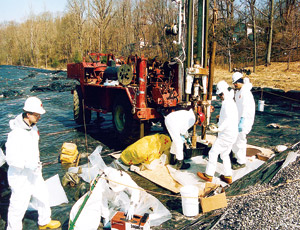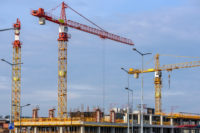Maintenance and compliance remain the primary drivers for environmental infrastructure projects in the U.S. However, although funding remains a challenge for many communities, sentiments about the sector’s prospects are, on the whole, upbeat.

“It looks stable and strengthening, even though there aren’t many opportunities for new facilities right now,” observes Dan Batrack, CEO of Pasadena, Calif.-based Tetra Tech, whose firm is designing a $564,000 disinfection facility at the Birmingham Wastewater Treatment Plant in Kansas City, Mo.
One reason for the optimism is a clearer funding picture for communities. In addition to the $6 billion in total American Recovery and Reinvestment Act funding distributed through state-level revolving funds, reduced volatility in the financial markets has restored governments’ access to capital.
“The remaining challenge for localities is having the political will to impose service rates that will sustain the required investment in infrastructure, operations, and maintenance,” says Bob Bailey, president of the Water Business Group of CH2M Hill, Englewood, Colo. While that may be easier said than done in areas still stung by the recession, he adds, “Most people understand that this infrastructure is necessary for economic growth.”
Financial stability has come at a good time for communities facing mandates to address issues with combined sewer overflows (CSOs) and other sewer infiltration problems. In Cleveland, CH2M Hill is currently managing a capital improvement program to minimize CSOs that includes a $200-million renewable energy facility to replace existing biosolids (sludge) dewatering, handling, incineration and malodorous-gas treatment systems at the city’s Southerly Wastewater Treatment Plant.
“A lot of consent-based programs in large cities are moving from study to design phase, helping stabilize part of the market,” notes Donald E. Stone, CEO of Dewberry, Fairfax, Va. That firm recently completed infiltration/inflow studies in Boston’s Longwood Medical Area, and North Providence, R.I. Perhaps the biggest opportunities in environmental infrastructure are in projects that respond to climate-driven changes to the water cycle, particularly reclaiming and moving large amounts of water to areas where existing sources are no longer sufficient to meet growing demand. For example, CH2M Hill is providing design and program management services for the Aurora Prairie Water Program near Denver. The $800-million project will apply a multistep process of natural and advanced purification technologies to treat up to 50 million gallons of reclaimed water a day from the South Platte River. Fairfax County, Va., is also eyeing a five-mile pipeline that will transport more than 580 mgd of reclaimed water from its main wastewater treatment facility to various locations for irrigation and other non-potable uses.
On the cleanup side of the market, the U.S. Army Corps of Engineers has begun awarding five-year indefinite delivery/indefinite quantity contracts for the $475-million multi-agency Great Lakes Restoration Initiative, which targets contaminated sediment, non-point-source pollution and invasive aquatic species in the Great Lakes Watershed.
Strength in the federal market partially has offset continued sluggishness in private-sector cleanup projects, says Curt Cramer, who is the executive vice president of ARCADIS, based in Littleton, Colo. “Economic conditions have had a clear impact on how clients view discretionary spending,” he says. “For example, the real estate collapse has put the value of many brownfield sites below what it would take to move forward with a cleanup.” On the other hand, Cramer sees a growing trend among private-sector firms to reduce their environmental liability by outsourcing site remediation oversight. In the past six months, ARCADIS has received nearly $270 million in new contracts for site closure and portfolio management.
| Rank* | Firm | $ Mil. |
|---|---|---|
| 1 | CH2M HILL | 620.0 |
| 2 | AECOM Technology Corp. | 418.5 |
| 3 | MWH Global | 384.6 |
| 4 | CDM | 300.0 |
| 5 | Arcadis/Malcolm Pirnie | 286.0 |
| 6 | HDR | 208.9 |
| 7 | URS Corp. | 206.2 |
| 8 | Black & Veatch | 199.8 |
| 9 | Tetra Tech Inc. | 140.0 |
| 10 | Brown and Caldwell | 138.0 |
| *Based on 2009 contracting revenue from sewerage and solid waste as reported in enr’s survey of leading contractors and design firms. | ||



Post a comment to this article
Report Abusive Comment